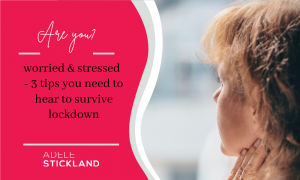Foggy thoughts, memory lapses, feeling excessive overwhelm, ostracised at work are the more insidious feelings of the menopause. The hot flushes, night sweats, difficulty sleeping are the obvious ones. This blog will give you the strategy and nutritional help you need to breeze through your menopause. Giving you the information and resources you need to dive deep and find out what is causing your menopause symptoms and the tools to remove menopausal fat gain around your tummy. Menopause symptoms can be numerous and hard to directly attribute to your natural body changes, the more you know and understand your body the easier it is to adapt to the alterations your body is going through. Over and above your menopause, there are other factors that need to be considered.
I love Caryn Franklin’s observation about the menopause – she hits the nail on the head when she observes:
“In menopause, your body roars. All these years it has put up and shut up and now will not tolerate abuse or disrespect any longer. “ Caryn Franklin
After decades of living a busy, fast-paced life the menopause comes and gives you a ‘slap’. The menopause is a natural and direct result of hormone changes and your body adapting, however, if your body wasn’t working well before your menopause it isn’t going to cope very well during it.
Your body is well equipped to cope with hormonal adaptations if you head towards the menopause in a calm, easy manner, your body will adapt beautifully. The problems occur and the symptoms become more pronounced when ‘real-life’ bumps up the scorecard.
Understanding your own personal biology, your hormones and reviewing your own current lifestyle choices will help you to unravel how you are feeling and why and give you the confidence and motivation to make some simple changes which will reduce your symptoms.
Hormones and your menopause
Oestrogen is the female sex hormone that regulates your menstrual cycle. It is also important to how your skin looks, whether your bones are strong and healthy and it can protect you against heart disease.
When levels of oestrogen in the blood are highest the hypothalamus in the brain release hormones that make a follicle release an egg, therefore if you are not producing enough oestrogen you will not ovulate. It is produced by the ovaries and naturally declines after you go through the menopause.
Progesterone is produced by the ovaries and adrenal glands and it also helps to regulate your monthly menstrual cycle.
Testosterone is a male hormone but women still produce small amounts of it in their ovaries. Testosterone is produced by the ovaries and helps to regulate sex drive (libido), energy and mental state. Following natural menopause testosterone will continue to be produced by the ovaries in significant amounts for approximately twelve years.
The Hypothalamus is in the deep centre of your brain and is the size of a pea. It controls the pre-programmed messages that release an egg during your menstrual cycle and it also controls your heart rate and your temperature. Do you see the link to hot flushes and increased heart rate?
The cycle is created when the hypothalamus SIGNALS to the ovaries, the ovaries receive the hormone signal and release an egg then the hypothalamus stops sending messages as soon as the egg is released. It all works reasonably well.
The Menopause Effect
During the menopause, you stop releasing eggs from your ovaries. This generally happens after a lifetime of eggs – around 400 of them. Towards your late 40s your eggs are more sporadic and your periods vary. If you release an egg one month you will have what you consider to be a normal period if you don’t your period may be heavier and more like the type you had when you were a teenager. Changes like this are natural. The average age of menopause is 51.
The perimenopause stage can last up to 4 or 5 years as the ovaries begin to switch off and other glands take over the role of producing your estrogen and progesterone. This adaptation in the body is normal. You are not supposed to need all these hormones anymore, after the age of 51 your body thinks you no longer want to be fertile
As the ovaries finish with their work naturally another gland takes over the production of your sex hormones. Your ovaries go into retirement and they no longer produce the same amount of hormones.
Don’t miss: Healthy tummy? inside and out?
Your body’s natural change
Interesting it is your adrenal gland that assists and reports back to the hypothalamus. Your adrenal glands sit on top of your kidney and feedback to the hypothalamus to turn off the message of egg release. All being well your adrenal glands continue to produce small amounts of progesterone. In addition, your body can also manufacture progesterone from dietary cholesterol – if of course, you are not on a low-fat diet.
If your adrenal glands have been overworked, overstretched in the years leading up to your menopause, they are not in a great position to cope with the extra load that is now required of them.
Your adrenal glands are the backup when your ovaries go into retirement. And if you go into the menopause with weak adrenals the bottom line is that your menopause symptoms are going to be worse.
The link between the ovaries retiring and the adrenals taking over and completing the circuit to the hypothalamus is not working properly so the hypothalamus starts shouting and increasing the temperature and increasing your heart rate and other menopause symptoms. The hypothalamus sends more signals to the adrenal gland and when the adrenal gland is busy working it doesn’t hear the messages from the hypothalamus. So the hypothalamus SHOUTS EVEN LOUDER and releases more hormones to kick start the adrenal gland.
The hypothalamus releases more hormones which stimulate more cortisol production in the adrenal glands until they become exhausted. *
Cortisol production increases to cope with the demand on your adrenal glands because the ovaries are in retirement and too much cortisol in your blood system will have the following effects on your body:
- Shuts down unnecessary functions, like reproduction and the immune system
- Cortisol also inhibits insulin from shuttling glucose into cells – increasing the level of insulin in your body
- Cortisol inhibits the uptake of amino acids into the muscle cells, therefore you can’t fuel muscle cells
- Inhibits bone formation
- Decreases calcium absorption in the intestine
- Your blood pressure also goes up
Belly fat isn’t based on age
After 3 caesareans and 6 pregnancies, tummy weight gain is my forte. After 20 years of experience as a Pilates professional, I am aware of the effect of exercise can have on your tummy but you also need to be aware of your hormones when it comes to weight gain around the belly. It takes more than a simple exercise programme to deliver great results. It isn’t genetics or hormones on their own that create the menopausal tummy.
Belly fat isn’t based on how old you are, fat around your belly comes from stress.
Don’t miss: Comparison is the thief of your happiness
It is the cortisol release that brings on the menopause systems, one of which is abdominal fat as well as other symptoms which include:
- Loss collagen
- Atrophy – loss of muscle strength
- Joints creaking
- Bone loss
- Decrease resistance to stress
- Facial hair
- Belly fat
Long term stress and you get fatter – around the belly! Which increases when you reach your menopause, because your adrenals have to work even harder than they did before.
Stress is a big contributor to your menopause
Therefore it is not your menopause that creates your symptoms and the abdominal fat. Your stress levels are the biggest trigger to abdominal fat which increases around the menopause. Stress triggers a hormonal change in your body, you produce more cortisol and belly fat increases.
Your solution
HRT is the solution for many women and this produces synthetic female hormones and bypasses the adrenal gland and tells the hypothalamus that everything is well. It is masking the adrenal problem.
The solution:
- Reduce stress
- Eat well and reduce sugar highs and lows
- Eat fat and proteins
- Mindfulness exercise like Pilates 😉
- Enjoy life
- Be kind to yourself
It is interesting that the solution is always the same, your lifestyle is creating the problems, change your habits and your body will heal itself.
Feeling good about yourself and feeling fulfilled comes from learning about yourself and what you can do to make changes. Happy changes. Interested? Book a call with me to find out more
Speak soon
Find me on youtube and you will automatically receive the most recent Pilates and Gorgeous Cardio workouts plus my VLOGS on nutrition and food – click here to find my channel and SUBSCRIBE
Get Gorgeous is a journey together – yours and mine.

PS. Don’t forget the gorgeous book – your insight into great health and vitality Gorgeous! how to look and feel fantastic every day. Click here to find out about your Gorgeous book
“Gorgeous! is the perfect read for anyone looking to revolutionise not only their relationship with food and movement but also their relationship with themselves. With Adele’s reassurance and expert guidance, any woman will feel inspired and empowered to begin their journey to prioritising themselves and their health – everybody is perfect and everybody is gorgeous!”
Find out what other gorgeous girls have to say…
Anne-marie Edworthy Teacher Gorgeous Premier 23rd November 2017
*The synthesis of cortisol in the adrenal gland is stimulated by the anterior lobe of the pituitary gland with ACTH; ACTH production is, in turn, stimulated by CRH, which is released by the hypothalamus.




















6 responses to “Breeze through your menopause”
Adele you continue to be fabulous and never cease to make me smile ? xxx live your Gorgeousness ☺ ?
Hi gorgeous Emily Thanks for your lovely comments much love Adele x
Adele that was so enlightening!!! And explains a lot!!!! Wow – myself and my nan both developed asthma during the menopause which I suppose could be related to the immune system being affected? I’ve noticed my heart rate going crazy ( not helping with anxiety) . Wish I’d known this before! Thank you you are fab xxxx
Hi gorgeous Sally
Thanks for your comments I am glad you found the article helpful. INcreased heart rate is a symptom of the hypothalamus become more active which as you say doesn’t help with feelings of anxiety. I do believe that once you know why you are having symptoms and that it is fairly normal. It will help with over anxious thoughts. What do you think? Much love Adele x
[…] in your body that leads to health issues which include abdominal fat. Don’t miss Menopausal weight sits on your tummy This blog outlines in detail why belly fat isn’t based on age at all – it is caused by […]
[…] Drinking coffee first thing in the morning disrupts your normal circadian rhythm and your hormones. Namely your cortisol hormone. You are very familiar with cortisol and you know from previous blogs that cortisol is linked to stress and will increase body fat: Read more Hormones including cortisol create belly fat […]